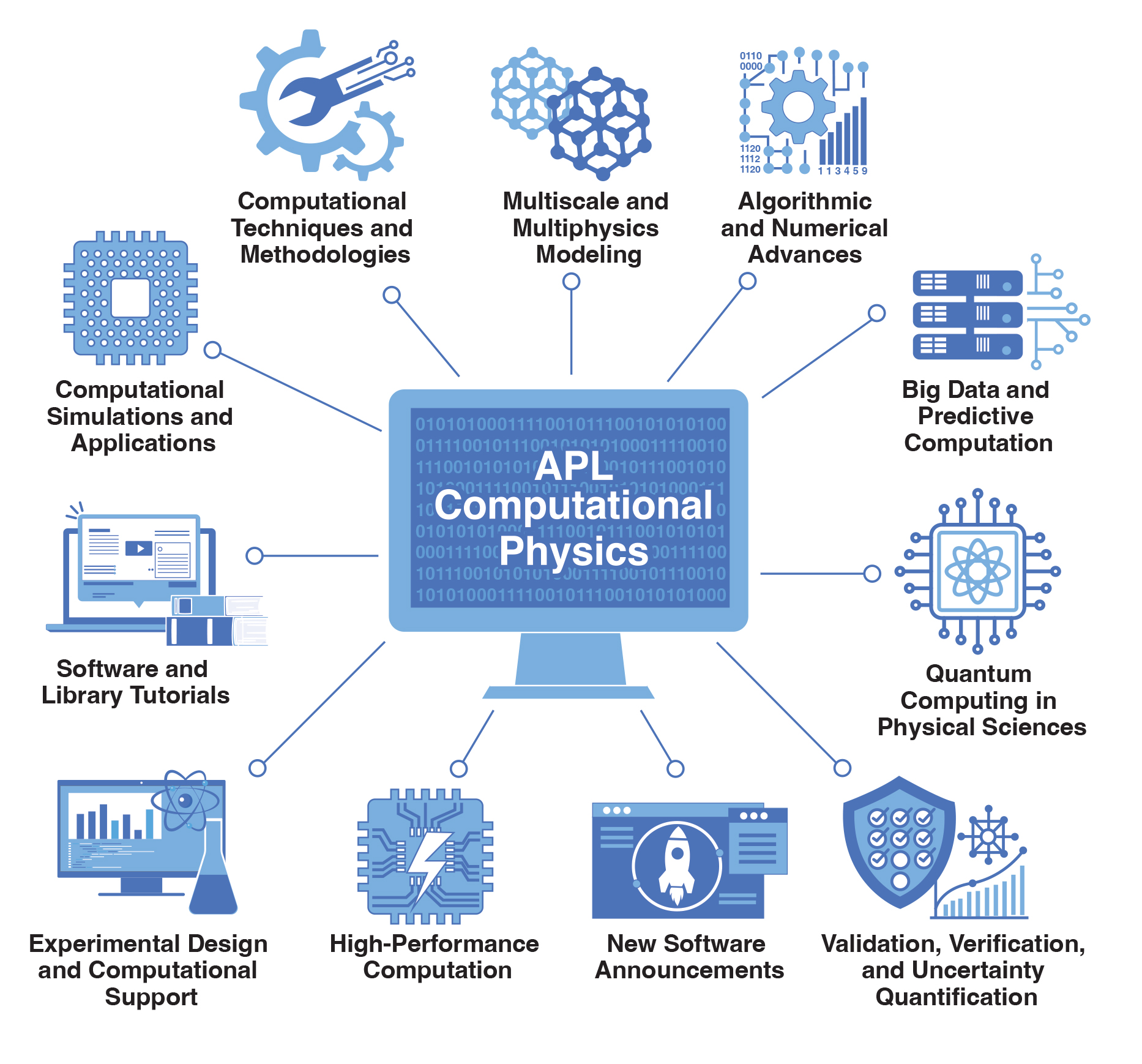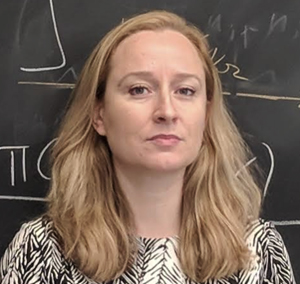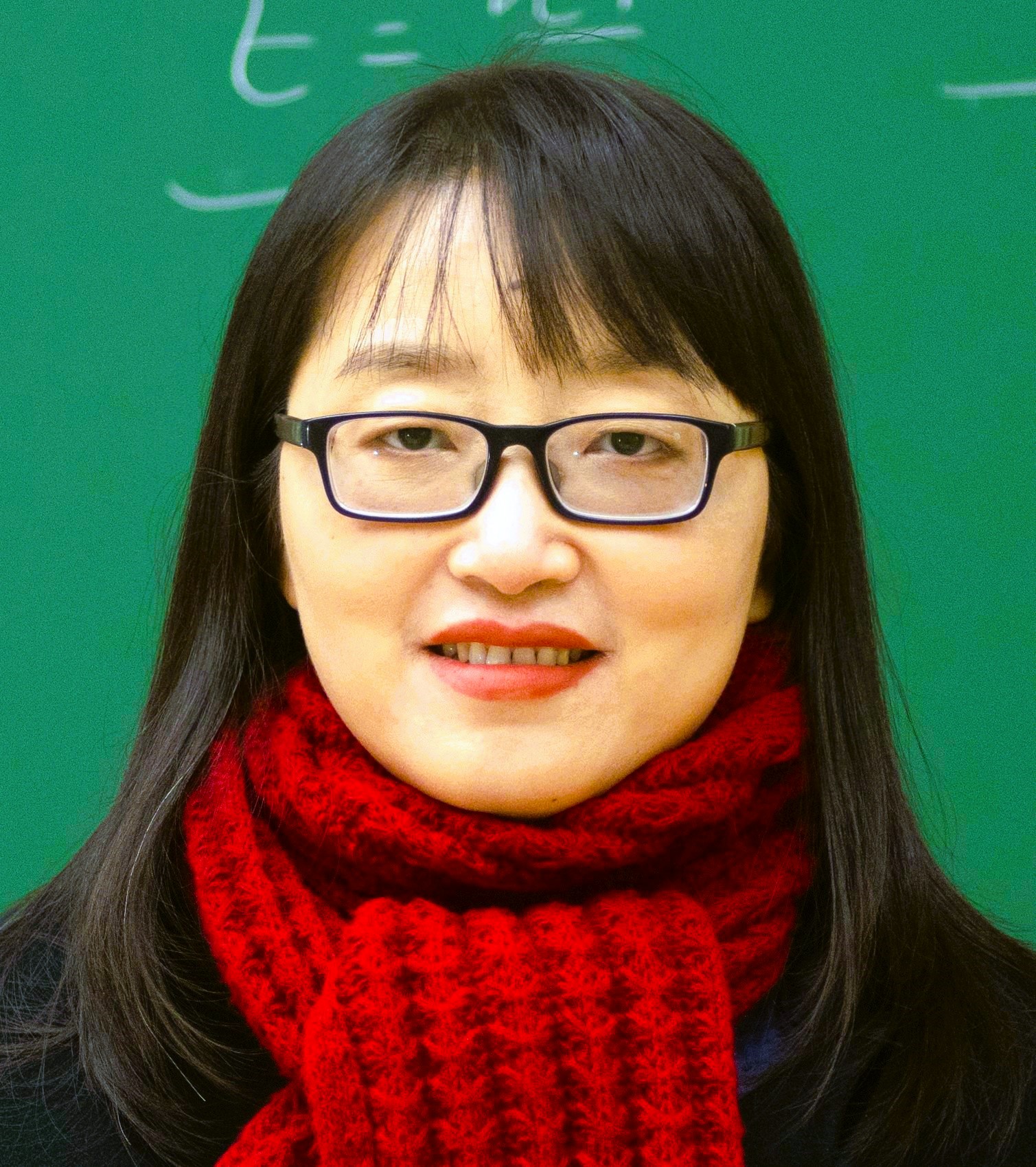APL Computational Physics: Now Open for Submissions

Focus and Coverage | Editorial Policies | Format and Content | Preparing Your Manuscript | Data Availability and Reporting Standards | The Review Process | Open Access Statement | Editorial Team | Subscribe to our Newsletter
No Article Processing Charges (APCs) For Submissions Through December 31, 2025

Focus and Coverage
APL Computational Physics is a dynamic open-access platform for the rapidly evolving landscape of physical sciences where computational techniques drive groundbreaking research. The journal offers a dedicated venue for diverse computational physics models, methods, and simulations across a broad range of physical science disciplines. Emphasizing interdisciplinary approaches, it highlights the integration of computational innovations to tackle complex physical challenges.
 APL Computational Physics will publish research that features the powerful impact of computation across the physical sciences, including, but not limited to:
APL Computational Physics will publish research that features the powerful impact of computation across the physical sciences, including, but not limited to:
- Computational Simulations and Applications: Computational research that offers novel physical insights across diverse areas, including, but not limited to, condensed matter, nanoscience, molecular science, spectroscopy, nuclear physics, high-energy physics, biophysics, environmental science, and astronomy.
- Computational Techniques and Methodologies: Broad coverage of computational theories, methods, models, and techniques, such as density functional theory, wave function theory, stochastic approaches, and more.
- Multiscale and Multiphysics Modeling: Advanced techniques that connect different scales and physical regimes, addressing nonlinear dynamics, coupled systems, and cross-domain applications.
- Algorithmic and Numerical Advances: Cutting-edge innovations in algorithms, numerical methods, and software that enhance simulation, optimization, and computational efficiency for solving complex physical problems.
- Big Data and Predictive Computation: Utilizing AI, machine learning, and data-driven approaches to advance physical science applications, refine models, uncover emergent behaviors, and generate new insights into established theories.
- Quantum Computing in Physical Sciences: Applications of quantum computing to solve physical problems, including quantum simulations, error mitigation techniques, and hybrid quantum-classical algorithms.
- Validation, Verification, and Uncertainty Quantification: Robust methodologies for validating and verifying computational models, tools, and software, alongside quantifying uncertainties in complex physical systems.
- High-Performance Computation: Advanced strategies enabling high-throughput experimentation and large-scale simulations.
- Experimental Design and Computational Support: Leveraging computational models to enhance the design, execution, and interpretation of experimental research.
- Software and Library Tutorials: Detailed guidance on using computational physics software modules for simulations and implementing libraries to develop and apply new methodologies.
- New Software Announcements: Introducing novel computational physics software and tools, highlighting their features, capabilities, and potential applications in advancing simulations and methodologies.
By emphasizing these broad and interconnected areas, APL Computational Physics aims to become a leading platform for pioneering research, driving innovation and fostering collaboration across the global computational physics community.
Editorial Policies
Criteria for Publication
APL Computational Physics considers manuscripts for publication that meet the following criteria:
- Contain novel and high-quality research that is of interest to the broad computational physics community.
- Present research that is timely and has significant potential to advance the field.
- Demonstrate results supported by rigorous data, methods, and analysis.
Format and Content
APL Computational Physics publishes the following article types:
Articles contain novel and significant findings relevant to many researchers in the field. The timeliness, relevance of the research, and clarity of presentation are important factors that we consider when evaluating Article submissions. Articles should include sufficient experimental information to allow other researchers to reproduce the reported results. Authors may include supplementary material, including video or other multimedia files.
Reviews are succinct overviews that provide historical background and detail recent progress in topics covered by the journal’s scope. Reviews should be written in a way that enhances or introduces the work to researchers in the field. These are by invitation only.
Perspectives cover emerging topics or highlight a recent scientific discovery and/or industry direction. They provide a forward-looking discussion on the direction of a particular sub-field. Perspectives differ from Reviews in that they can present personal viewpoints from leaders in the field. These are by invitation only.
Tutorials have a strong educational focus and are meant to provide an overview of the fundamental principles and techniques which are important within a given field or sub-field. These articles should be particularly useful for students and/or senior researchers looking to increase their understanding of a field that is new to them. These are by invitation only.
A Roadmap is a type of review article. These are by invitation only. This article type combines multiple sections, each written by different authors. The content of a Roadmap should focus on the status, advances, challenges, and future directions of subtopics within a field from multiple expert perspectives. As a united review, the Roadmap should provide a high-level overview of the field as a whole. Roadmaps should be composed when there is a need or opportunity for useful discussion and evaluation of the field. Authors who wish to submit a Roadmap without an invitation may provide a strong case for why their Roadmap is timely and of interest to the readership of the journal. Please contact the Journal Manager at aplcp-journalmanager@aip.org for further information.
Special Topic Issues are published occasionally and contain a grouping of Articles, Reviews, Perspectives, and/or Tutorials on a topic of current or emerging interest. These are intended to be reports of original research that significantly advance our understanding of the field. Editors review Special Topics using the usual publication criteria. Journal editors or Guest Editors may assemble a Special Topic.
Comments and Responses address scientific issues within articles published in the journal. Researchers considering a Comment are encouraged to directly contact the authors of the original article first, as comments will be published only if the same result cannot be achieved through publication of either an Erratum or a new article. We discourage Comments on questions of priority or calling attention to an oversight in a reference list.
Generally, the authors of the original article will be invited to submit a Response to the Comment, and the Comment and Response will be peer reviewed together. If the Comment and Response are both accepted, they will appear in the same journal issue.
No further exchange beyond this point will be considered for publication.
Comments and Responses should be no longer than roughly 1000 words.
Errata are corrections of errors in previously published papers. These may be errors introduced in the publication process by the author or the publisher, or errors in the research that were discovered after the paper was published. Errata should be confined to specific errors. Further discussion or additional work that either confirms or denies previous work should be presented as a separate Article or Comment.
Manuscript Length: There is no length limit in this journal; however, manuscripts should be concise and present a clear description of the research for reproducibility.
Data Availability and Reporting Standards
AIP Publishing believes that science should be shared as widely as possible, and we actively support sustainable models of access to research that ensure the permanence, discoverability, and reuse of published work. All data, methods, and models should be well documented and described either in the main text of the article or supporting information to provide the research community with enough transparency and detail to effectively replicate the findings and reuse results to further their research.
APL Computational Physics requires that authors make any new data, code, and additional supplementary material publicly available on a repository of the author’s choosing at the time of submission. Any reasons that the material cannot be made available to the readers should be disclosed to the editors.
The Review Process
The Editor-in-Chief, aided by the Associate Editors, is responsible for the content and editorial matters related to APL Computational Physics. To identify papers that meet the journal’s publication standards, the editors initially screen all submitted manuscripts. Manuscripts that pass the screening are evaluated by expert referees. Generally, two referees are sought, but decisions on publication may be made with additional reviews if required. Generally, we decide whether to publish a manuscript after one or two rounds of review. We will allow additional reviews if deemed necessary by the editors.
Language Standard
It is the authors’ responsibility to ensure that manuscripts are written clearly. A manuscript can be rejected if the scientific meaning is unclear due to poor English. Manuscripts that do not meet APL Computational Physics’ language standard will be returned to the authors for rewrite before peer review, during the review process and/or if provisionally accepted pending language editing.
Because good science has no value unless it is clearly communicated, AIP Publishing recommends that authors use AIP Author Services to improve the quality of your paper’s written English. Using this service ensures that your paper will be free of language deficiencies, so editors and reviewers will be able to fully understand your research during the review process. A native English-speaking subject matter expert of AIP Author Services will correct spelling, grammar and punctuation and verify the use and consistency of technical terms and content in your paper. Note that this is not a requirement or a guarantee of acceptance for review or publication.
Transfers
If your manuscript is not accepted for publication in APL Computational Physics, an editor may recommend a transfer to another AIP Publishing journal for immediate consideration. In some cases, the transfers are offered after consultations with the editors of other AIP Publishing journals.
If you choose to transfer your manuscript, all reviewer reports and editor recommendations will be transferred along with the manuscript. Please visit the receiving journal’s website for more information. Manuscripts must meet the receiving journal’s acceptance criteria. Note that there is no guarantee that the receiving journal will publish a transferred manuscript. A list of AIP Publishing journals and descriptions can be found here.
The Appeals Process
Authors may appeal a decision to reject a manuscript. To submit an appeal, authors can visit the APL Computational Physics submission site. To receive further consideration, the authors should request a formal appeal with justification for why the manuscript requires further consideration. If referee reports were included with the rejection letter, the comments must be addressed in the appeal request.
Once an appeal is submitted, the editors will collate all information relevant to the manuscript, including the cover letter, communications with the authors, and referee reports, if any. This information is discussed with the Editor-in-Chief, editors who worked on the manuscript, and any relevant Editorial Board members. When reviewing an appeal, any member of the Editorial Board with a real or perceived conflict of interest will not participate. The discussion will focus on the manuscript under consideration, the range of submissions the journal receives in the area, the overall status of the field, and the editors’ expectations for a paper in the area.
Successful appeals focus on clarifying the suitability or importance of the work if the editors rejected your manuscript because it did not fit APL Computational Physics’ criteria for publication. If the editors rejected your manuscript based on technical issues, your appeal must rebut the technical issues raised in the referee’s reports. In your appeal, please address APL Computational Physics’ acceptance standards. Also, keep in mind that because your manuscript was initially rejected, you must provide an insight or argument that goes beyond what the editor has already learned through the review process, thereby compelling the editor to conclude that your manuscript deserves further consideration.
Consider the following points when making an appeal:
- Do not include a simple revision of the manuscript to address referees’ comments. If a simple revision would have addressed the main issue, the editors would have returned your manuscript and allowed you to update it. Do include a strong argument for why the editors should reconsider your manuscript.
- Do not resubmit the manuscript under a new manuscript number, even if it has been updated in response to reviewers’ comments. The editorial office rejects resubmissions; instead, use the appeal process to request that the editors reconsider your manuscript.
- Do not reinterpret the referees’ reports for the editors. Do provide the editors with new information or insights that might lead them to reconsider publishing your manuscript.
- Do not provide a list of articles on the same topic that have recently been published in APL Computational Physics. Do provide information that supports the novelty and importance of your work.
Retraction and Correction Policies
AIP Publishing’s policy is based on best practices in academic publishing. We take our responsibility to maintain the integrity and thoroughness of the scholarly record of our content seriously. We place great importance on the accuracy of published articles. Authors may make changes to articles after they have been published online only under the circumstances outlined in AIP Publishing’s Retraction and Correction Policies.
Open Access Statement
APL Computational Physics is an open access journal. Articles published in APL Computational Physics are freely accessible, without restrictions, to the global public. Authors who wish to publish in APL Computational Physics retain the copyright to their work under a Creative Commons license. Under this license, users are free to share and adapt the material in any format, provided appropriate credit is given. Visit the AIP Publishing Open Access Policy for more information about our policies on open access.
Editorial Team

Editor-in-Chief
Xiaosong Li
Prof. Xiaosong Li is the Larry R. Dalton Endowed Chair in Chemistry and the Associate Dean for Research in the College of Arts & Sciences at the University of Washington. He earned his Ph.D. in Chemistry from Wayne State University in 2003 and subsequently served as a postdoctoral researcher at Yale University before joining the University of Washington in 2005. In addition to his faculty role in the Department of Chemistry and the Department of Materials Science and Engineering, Prof. Li is a lab fellow at Pacific Northwest National Laboratory.
Prof. Li is internationally renowned for his contributions to time-dependent quantum theory and relativistic electronic structure methods. His interdisciplinary research bridges the fields of physics, chemistry, materials science, mathematics, and computer science. Over his career, he has published 300 peer-reviewed articles and developed several widely used computational software packages.
Prof. Li’s achievements have been recognized with prestigious honors, including a Sloan Research Fellowship, the National Science Foundation CAREER Award, the American Chemical Society Jack Simons Award in Theoretical Physical Chemistry, and the University of Washington Distinguished Teaching Award. Prof. Li has been recognized as a Fellow of AAAS, the American Physical Society, and the Royal Society of Chemistry and is an elected member of the Washington State Academy of Sciences.
Associate Editor
Hongjun Xiang
Hongjun Xiang is a Distinguished Professor in the Department of Physics, Fudan University, and recipient of The National Science Fund for Distinguished Young Scholars. Specializing in computational condensed matter physics, he has made seminal contributions to multiferroic material modeling and computational method development. Key achievements include proposing unified models for spin-order induced ferroelectricity, devising the four-state method for calculating magnetic interactions and magnetoelectric coupling strength, and introducing the concept of fractional quantum ferroelectricity. He developed the PASP (Property Analysis and Simulation Package for materials) software package, which includes several machine learning algorithms. He has published more than 200 papers (including 30+ in Physical Review Letters). Recognitions include the ICTP Prize (2018), APS Fellowship (2021), Huang Kun Physics Award (2023), and the 2024 XPLORER PRIZE.

Associate Editor
Dominika Zgid
Dominika Zgid is a professor of Chemistry and Physics at the University of Michigan. She joined the University of Michigan in 2012 after earning her PhD from the University of Waterloo, Canada in 2008 and completing her postdoctoral work at both Cornell and Columbia Universities. Over the course of her career, she has received a DOE Early Career Award in 2013, an NSF Career Award in 2015, and a 2018 Medal of International Academy of Quantum Molecular Science.
Her primary interests lie at the intersection of theoretical chemistry and condensed matter physics, focusing on designing new, systematically improvable, and controlled computational methods for studying correlated molecules and materials. Her research spans various topics, including a molecular version of the density matrix renormalization group, solvers for dynamical mean field theory using explicit bath formulation, conserving Green’s function methods, the development of methods with inclusion of relativistic corrections, and the development of ab-initio embedding Green’s function methods.

Associate Editor
Jin Zhao
Jin Zhao is a professor of physics in the University of Science and Technology of China. The focus of her research is ab initio investigation on the dynamics of excited carriers in condensed matter systems. She combines methods of many-body perturbation theory with molecular dynamics to model the coupled ultrafast time scale charge, spin, and lattice quantum interactions in condensed matter and quantum materials within the shared Hefei-nonadiabatic molecular dynamics (Hefei-NAMD) code. She is a recipient of the National Science Fund for Distinguished Young Scholars (2021), the China Young Female Scientist Award (2023), and is an elected Fellow of the American Physical Society (APS) (2023).
Subscribe to our Newsletter
ISSN: 3066-0017 | CODEN: ACPAHU
